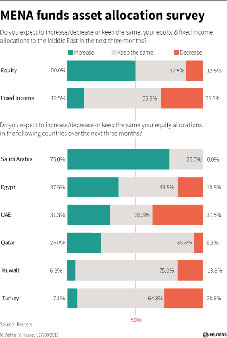Fund managers in the Middle East are set to pump more money into Saudi Arabia over coming months but may withdraw some funds from Dubai because of concern its red-hot market has risen too fast, a Reuters survey showed.
The survey of 16 leading Middle East-based investment institutions, the first of its kind in the region, was conducted over the past 10 days by Trading Middle East, a Reuters forum for market professionals. The survey was launched in September and will be published monthly.
Half of the institutions said they expected to increase their overall equity allocations to the Middle East over the next three months, while only 13% said they would decrease them.
Fund managers cited strong economic growth in the Gulf, which is being aided by high oil prices and consumer spending booms in many countries, as well as young and growing populations across the Middle East. For many managers, these factors outweigh jitters over geopolitical threats such as the civil war in Syria.
“We are strong believers in the region and are constructive on its capital markets,” said Ziad Chaaban, managing director for asset management at Egyptian investment bank EFG-Hermes. “We think favourable macroeconomic and demographic drivers will push the growth trajectory higher and with it the size and liquidity of the capital markets.”
Saudi Arabia’s stock market, where the main index has risen 17% this year, lagging several other Gulf bourses, looks set to be the main beneficiary of this optimism in coming months.
Three-quarters of the 16 institutions said they expected to increase their equity allocation to Saudi Arabia in the next three months, while none expected to reduce it.
In addition to Saudi Arabia’s economic growth, the country has been preparing for years to open its stock market to direct investment by foreigners. A date for the reform has not been set but many in the industry think it could happen by early next year, which would almost certainly boost stocks.
By contrast, many institutions expressed caution about stock markets in the UAE, where Dubai has rocketed 71% this year on the back of a recovery in its real estate prices, and Abu Dhabi is up 46%.
Much of Dubai’s most recent gains have been due to heavy trading by local retail investors. International index compiler MSCI has decided to upgrade the UAE and Qatar to emerging market status next June, which should attract fresh foreign money.
But Middle Eastern institutions, believing many Dubai stocks have become fully valued for now, are less bullish about the short term; Dubai is trading at about 16 times last year’s corporate earnings, compared to about 13 times for the MSCI Emerging Markets Index.
“To get a 60% increase in eight months - this scares me. Each time we get a big increase in the market it is followed by a big decrease,” Abdullah al-Durdunji, chief treasury officer at the Abu Dhabi Fund for Development, said of Dubai’s volatile market.
He said his personal view was that it made sense to cut UAE equity exposure and increase holdings of fixed income instruments from high-quality firms, while hedging the risk that US interest rates could rise and pull up rates in the Gulf.
Thirty-eight percent of the institutions said they expected to decrease their equity allocation to the UAE in the next three months, while 31% intended to increase it and the rest said they would keep their UAE exposure flat.
Many foreign portfolio investors have stayed out of Egyptian markets this year because of the economic and political turmoil surrounding the ouster of former president Mohammed Mursi in July.
But the Reuters survey suggested some institutions may return in coming months as $12bn in financial aid pledged by Egypt’s Gulf allies helps to stabilise its economy.
Thirty-eight percent of institutions said they expected to increase their equity allocation to Egypt over the next three months, while 19% said they would probably reduce it.
There was less optimism about Turkey, where the stock market is down 4% this year and the lira currency has tumbled to record lows against the US dollar as rising US interest rates have slashed the foreign capital inflows on which Turkish markets have depended.
Only one institution - 7% of the respondents to that question - expected to increase its equity exposure to Turkey in the next three months, while 29% predicted they would reduce it.

